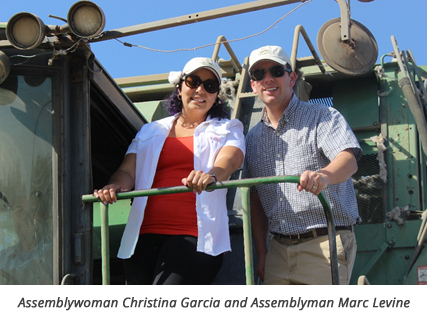Competing against 14 major U.S. universities with agriculture programs, Fresno State’s Plant Science Club brought home the President’s Trophy for the national Students of Agronomy, Soils and Environmental Sciences (SASES) club speech contest. The completion was held during the Tri-Societies (American Society of Agronomy, Crop Science and Soil Science) recent national conference held in Long Beach, CA. The contest challenged student clubs from agriculture universities to showcase their activities in community service, educational outreach, and professionalism in plant/crop and soil sciences. Armando Guzman, also one of two Fresno State Plant Science students selected as a Golden Opportunity Scholar, presented the slide show on the Plant Science Club’s activities. This is the second win in the three years Fresno State’s Plant Science Club has participated in this event. A delegation of 12 Plant Science Club members was able to attend the conference from Associated Student Incorporated funds and cheered for the clubs accomplishment. Additional students competed in the College Quiz Bowl, Crops Judging Contest and served as delegates for the national SASES meetings. Mala To, Plant Science Club president, said “I am very proud of our accomplishments and involvement in this year’s club activities. Next year, our club members will be going to Minneapolis, MN to compete and bring home the Trophy again.”
NEWS & ISSUES
2014 FFA Cotton Judging Event
The team from Atwater FFA took the first place honors for the First High Team A at the 57th Annual State FFA Cotton Judging Competition held at Fresno State. Lemoore FFA took first place in the B competition. Team members judged cotton lint, seed, bolls, plants, and took a general knowledge test of the California cotton industry. Taking home individual honors was Atwater’s Amanda Skidmore in the A competition and Firebaugh’s Austin La Salle in the B competition. Bruce Roberts from Fresno State coordinates and hosts the competition, which was held on Saturday, November 8th this year. The California Cotton Ginners and Growers Associations, the California Cotton Alliance, and Supima are sponsors of the annual event held on the campus of Fresno State. Congratulations to all who competed!
Reminder — California STAX/Farm Bill Workshop
As a reminder, NCC will hold a STAX/Farm Bill Workshop on Monday, November 10, 9:00 a.m. at Harris Ranch in the Garden Ballroom. The address is 24505 West Dorris Drive, Coalinga.
This meeting is co-hosted by California Cotton Ginners, California Cotton Growers and the San Joaquin Valley Quality Cotton Growers Association.
We hope your schedule will permit you to attend this important meeting. Please contact Mike Brueggemann at (559) 696-6823 or mbrueggemann@cotton.org with any questions.
Thanks for your continued support of the National Cotton Council.
AECA and WAPA Present: Agriculture Energy Conference!
CASI Welcomes Dr. Andrew Price for two Seminar Presentations
Handling Employees Under the Influence
Question:
How should I handle an employee who reported to work obviously under the influence of drugs or alcohol? What can/can’t I say?
Answer:
Prior to taking any administrative action against your employee, SLG strongly recommends you consult with legal counsel as each case will be different and require separate analysis. The first thing to do in this situation is to relieve the employee from his duties as the employer has a duty to provide a safe working environment for all employees and the general public. As an employer, you are not required to tolerate an employee attempting to function in such a condition. Also, your “zero tolerance” drug and alcohol policy should prohibit employees from reporting to work under the influence of controlled substances (e.g., alcohol, marijuana, methamphetamine, heroin, cocaine, etc.) as well as prescription drugs, which are also often abused. You do not need to say anything specific at first, other than to tell the employee that he appears to be unable to perform his job functions and is being relieved of duty pending further investigation into his condition. Be sure to look for objective indications that the employee is under the influence as the employer will need to be able to articulate a reasonable suspicion that the employee is under the influence should a drug test be necessary.
Once the employee has been relieved of duty, escort the employee to a private area or room in the workplace for further questioning. Because there may be a legitimate reason for the employee’s behavior that is health-related and a privacy concern to the employee, it is best to deal with these situations in private. That said, feel free to ask the employee if he is under the influence of drugs. Surprisingly, employees sometimes admit to this. If the employee admits being under the influence, termination of employment would probably be appropriate absent some special circumstances – for example, perhaps the employee was legitimately taking a prescription drug that produced unexpected adverse reactions through no fault of or abuse by the employee. In the case where the employee admits using an unlawful drug, like marijuana, the employee should be subject to immediate termination.
It is important to look for objective indications that the employee is under the influence because under California privacy laws, an employer should not send a current employee for a drug test unless the employer has a reasonable suspicion the employee is under the influence. If, for example, you smell alcohol on the employee’s breath, the employee slurs his speech, you recognize the aroma of marijuana, the employee’s eyes are bloodshot, and/or the employee is stumbling into the walls or cannot stand up, you probably have reasonable suspicion to submit the employee to a drug test. If the employee then submits to a drug test and tests positive for drugs or alcohol, you have grounds to terminate the employee. If you have reasonable suspicion and the employee refuses to submit to a test, you could also terminate the employee. SLG recommends the implementation of a written reasonable suspicion policy in advance to educate employees and to obtain their written consent to be tested in addition to their consent at the time of the testing. Employees should be notified in advance of what substances will be tested for as well as the tolerable level of each.
Under Labor Code §1025, private employers with 25 or more employees shall reasonably accommodate employees who voluntarily enter drug/alcohol rehabilitation programs provided that the rehabilitation does not provide an undue hardship for the employer. However, there is no affirmative duty on the employer to allow an employee to enroll in or to attend a rehabilitation program. The employer also may terminate or refuse to hire an employee if the employee cannot perform his job duties because of current drug/alcohol use or poses a threat to the health or safety of himself or others. However, employers covered by FMLA/CFRA may be required to give time off to employees undergoing treatment.
Counsel to Management: Although certain scenarios might be straight-forward, it is always a good idea to consult with counsel as each case should be examined on a case-by-case basis. Please contact the Saqui Law Group if you have questions concerning any personnel issues.
OFF-THE-CLOCK WORK? NOT ON MY WATCH (or timesheet…)
One of the primary lessons from the recent class action frenzy is the importance of policing off-the-clock work. Nearly every class action lawsuit that we have recently seen has included a claim for off-the-clock work, i.e., early arrival, standing in line, donning and doffing, etc. These claims are very attractive to plaintiffs’ attorneys as they are easy to allege and difficult to disprove. In this respect, they can be the ideal glue to certify a class action. Relying on time records is no help, because the work is alleged to have happened before or after the recorded work hours. Thus plaintiffs can easily allege that they worked fifteen to thirty minutes before they signed in for their regular work without any hard evidence.
Attacking these claims is an expensive and labor intensive task as you need to interview and present sworn statements from a significant number of employees who may or may not be keen on participating in a legal proceeding. In addition, if the allegations arise in a class action setting, there are restrictions on communicating with putative class employees so that the employer must be careful and guided by counsel in securing the statements. Judges are also often skeptical of declarations when current employees are asked by their employer to sign a statement in the employer’s favor.
If you cannot defend against these claims with time records, what is an employer to do? The answer lies in strict policies and aggressive enforcement. It is absolutely critical that every employer have clear policies prohibiting off-the-clock work. Supervisors must be drilled into policing and preventing any off-the-clock work irrespective of the demands for production. That means immediate discipline for any violation. Employees should not be allowed to linger at the work premises before or after a shift. Loose enforcement of start and end times to meet production can buy the employer a business crippling lawsuit. Clear, regular start and end times are also helpful to the extent that they are possible.
To illustrate the danger of an off-the-clock work claim, consider the following sample scenario (using basic numbers for clarity). Happy Farms employs approximately 300 seasonal employees for a 30 week season every year under Wage Order 14. The employees work an eight hour workday, five days a week, earning an average of $12 per hour and are paid weekly. A former employee files a class action lawsuit alleging off-the-clock-work. This plaintiff alleges that employees were required by the employer to arrive fifteen minutes early before the regular start time to perform exercises and put on gear (gloves, etc.) before harvesting. Accordingly, he claims a minimum wage violation, waiting time penalties and inaccurate wage statement penalties. The exposure for the employer presuming class certification would be:
Minimum wage violation: $607,500 (15 minutes per day plus liquidated damages)
Waiting time penalties: $864,000 ($12 x 8 hour day x 30 days x 300 employees)
Inaccurate Wage Statements: $885,000 ($2950 per employee, max $4000)
Total Liability: $2,356,500
By having and enforcing effective written policies that are provided to the employees, you can provide your attorneys with the means to defend against these claims. In a recent California Court of Appeal decision, an employer prevailed against an employee that was claiming off-the-clock work. Jong v. Kaiser Foundation Health Plan, Inc. (2014) 226 Cal.App.4th 391. The court pointed out that the employee at issue “knew of Kaiser’s written policy that [employees] should be clocked in whenever they were working.” The court further pointed out that the employee signed a company form attesting that he would not work off-the-clock. Because of the policies and because the employer was not aware of the off-the-clock work, the employer was not liable. In reaching its decision, the Court of Appeal delineated an actual or constructive knowledge standard for employers with respect to off-the-clock work. In other words, the court found that employers are not responsible for unauthorized work performed by the employee unless the employer knew or should have known about the work at issue. Accordingly, employers with strong policies against off-the-clock work can rely on their policies and enforcement to combat these claims.
Counsel to Management: Employers should include clear prohibitions against off-the-clock work in their handbooks and written policies. They should further have employees sign a form acknowledging that they are not allowed to work before or after their start and end time or during rest or meal periods. Employers should further articulate and enforce a policy of recording all work hours. In this respect, supervisors must be well-trained on the paramount importance of keeping all work on the clock. For further guidance on off-the-clock work issues or policies, please contact The Saqui Law Group.
Association Hosts Assemblyman Bob Wieckowski

The Association hosted Assemblyman Bob Wieckowski (25th Assembly District – Fremont) for a tour and meeting with agricultural organization leaders, including California Citrus Mutual, California Fresh Fruit Association, Nisei Farmers League, Western Plant Health Association, California Rice Commission, California Dairies Inc. and the Raisin Bargaining Association. The day began with a visit to Firebaugh area almond and cotton grower Mike O’Banion to discuss the impact of the drought and lack of surface water in California. Representing the Association on the tour were President/CEO Roger Isom and Director of Technical Services Christopher McGlothlin. The group then visited Olam’s Silver Creek Gins. After that the group returned to the Association’s offices for a lunch and meeting with the participating agricultural groups. The tour and meeting was part of the Association’s ongoing effort to reach out to urban legislators to educate them on the critical issues impacting agriculture in the state.
STAX / Farm Bill Workshops
You are encouraged to attend one of the educational meetings the National Cotton Council has scheduled to provide its members with in-depth information regarding insurance options for cotton under The Agricultural Act of 2014. The meetings will provide an in-depth look at the new Stacked Income Protection Plan (STAX) and the Supplemental Coverage Option. Coverage levels, expected yields and premium rates will be covered in detail in order to better equip producers with the information necessary to evaluate the insurance options for 2015. The meetings also will include an update on overall farm bill implementation and a question/answer session.
(All Times Local)
Arizona
Casa Grande – November 11, 9:00 a.m.
The Property Conference Center – Ellington Ballroom, 1251 West Gila Bend Highway
California
Coalinga – November 10, 9:00 a.m.
Harris Ranch Inn & Restaurant – Garden Ballroom, 24505 West Dorris Avenue

Urban Legislators Tour Valley Agriculture
Assemblywoman Christina Garcia (58th Assembly District – Downey) and Assemblyman Marc Levine (10th Assembly District – Marin) toured several farms and processors in the valley. Association staff on the tour included President/CEO Roger Isom, Director of Regulatory Affairs Aimee Brooks, and Director of Technical Services Christopher McGlothlin. The tour included stops at citrus orchards, table grape harvesting and packing operation, aerial applicator operation, cotton gin, cotton field, dairy and pistachio operation. The tour included a ride on a cotton picker at grower Mark Trigueiro’s farm. Several issues were discussed during the tour, but the focus was the effects of the prolonged drought. Participating with the Association was the California Fresh Fruit Association, California Citrus Mutual, California Dairies Incorporated, and the California Agricultural Aircraft Association. The tour was part of the Association’s ongoing effort with the Agricultural Presidents Council (APC) to reach out to urban legislators to educate them on the critical issues impacting agriculture in the state.




